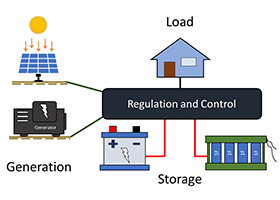Hybrid Power System Design
A special issue of Energies (ISSN 1996-1073). This special issue belongs to the section "F1: Electrical Power System".
Deadline for manuscript submissions: closed (10 January 2022) | Viewed by 6755

Special Issue Editor
Special Issue Information
Dear Colleagues,
It is a pleasure to invite you to contribute to this Special Issue on Hybrid Power System Design. Hybrid power systems combine more than one power source to meet the needs of a system. This could include a variety of energy conversion techniques, including solar, wind, electromechanical techniques, etc., as well as a variety of energy storage devices, such as batteries, fuel cells, and supercapacitors. System sizes may be as small as a few milliwatts to over 1 MW. Application areas include off-grid implements, low-power generation for biomedical devices, and transportation.
I look forward to receiving your contributions to this Special Issue.
Prof. Dr. Pritpal Singh
Guest Editor
Manuscript Submission Information
Manuscripts should be submitted online at www.mdpi.com by registering and logging in to this website. Once you are registered, click here to go to the submission form. Manuscripts can be submitted until the deadline. All submissions that pass pre-check are peer-reviewed. Accepted papers will be published continuously in the journal (as soon as accepted) and will be listed together on the special issue website. Research articles, review articles as well as short communications are invited. For planned papers, a title and short abstract (about 100 words) can be sent to the Editorial Office for announcement on this website.
Submitted manuscripts should not have been published previously, nor be under consideration for publication elsewhere (except conference proceedings papers). All manuscripts are thoroughly refereed through a single-blind peer-review process. A guide for authors and other relevant information for submission of manuscripts is available on the Instructions for Authors page. Energies is an international peer-reviewed open access semimonthly journal published by MDPI.
Please visit the Instructions for Authors page before submitting a manuscript. The Article Processing Charge (APC) for publication in this open access journal is 2600 CHF (Swiss Francs). Submitted papers should be well formatted and use good English. Authors may use MDPI's English editing service prior to publication or during author revisions.
Keywords
- Energy conversion devices
- Energy storage systems
- Batteries
- Fuel Cells
- Solar
- Wind
- Supercapacitors
- Power generation





